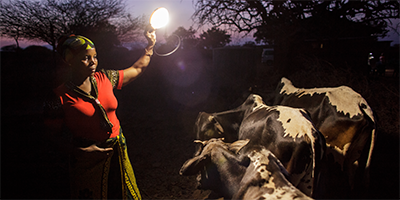About 1.3 billion people lack reliable access to electricity. This means turning to solutions like kerosene lanterns and diesel generators to provide light and energy for charging cellphones, studying, working, lighting remote pathways, powering medical equipment and caring for children. These fossil fuels can be expensive and difficult to transport, and burning them releases soot and emissions that make it hard to breathe and that contribute to climate change.
The majority of people with limited energy access live in rural places where traditional electric grids are not cost-effective. But renewable energy technology now makes it possible to produce clean electricity, even in extremely remote locations.
A pilot grant program from the United Methodist Committee on Relief seeks to increase the availability of 24/7, reliable, affordable energy access in communities with limited energy access by providing funding for renewable energy systems and infrastructure. The first two projects of the Renewable Energy Access grant program will improve energy access for communities in Tanzania and Liberia.
 |
| Fatma is able to better protect and tend to her livestock in the dark with the aid of solar light. Courtesy photo. |
In Liberia, the UMCOR board recently approved a $96,500 grant to provide the Gbarnga School of Theology campus with a 25-kilowatt solar array and backup battery system. In Tanzania, Solar Sister received a grant of $100,000 for its initiative to support a women's entrepreneurship and to supply clean energy across 16 regions.
A nonprofit organization, Solar Sister offers women economic opportunity, training, technology and support to distribute clean energy to communities in Africa. The project leverages Solar Sister's local leadership, extensive grassroots presence and partnerships and will equip 100 women to launch solar businesses.
The grant program, Thompson noted, "will help people from the community to save money, which they were using to buy kerosene." With the extra funds, they can pay school fees, see a doctor when they are ill, cover daily expenses, and improve their family diet by buying more and better food.
Solar lights also improve security, especially for women and girls when they walk at night. Those with cattle can leave their lamps out at night. And … well-lit houses can be a deterrent for thieves who want to stay anonymous in the dark.
"The other major change we anticipate is that people will be able to work more hours on their livelihoods. Many women, especially, use lights to work on projects into the night and so gain income. We see that children in homes with solar power study later, which often results in better academic performance and learning."
The project will last for one year. For every small product a woman sells, about five people in the community will benefit.
Some 5,000 miles away – in Bong County, west Africa – Gbarnga School of Theology is located at the United Methodist Mission Station. Seminary students come from across the Liberia Annual Conference.
The goal of the renewable energy access project is to decrease the school's dependence on diesel fuel for energy and increase the availability of round-the-clock energy.
"The availability of electricity on the campus of the Gbarnga School of Theology is indispensable to our commitment to provide healthy teaching and learning experience for our faculty and students," said the Rev. Dr. Jerry Kulah, seminary dean. "We have realized that our constant use of diesel fuel is not only harmful to the health of both faculty and students, but it is also impacting climate change."
Barbara Dunlap-Berg, freelance writer and editor, retiree from United Methodist Communications
One of six churchwide Special Sundays with offerings of The United Methodist Church, UMCOR Sunday calls United Methodists to share the goodness of life with those who hurt. Your gifts to UMCOR Sunday lay the foundation for the United Methodist Committee on Relief (UMCOR) to share God's love with communities everywhere. The special offering underwrites UMCOR's "costs of doing business." This helps UMCOR to keep the promise that 100 percent of any gift to a specific UMCOR project will go toward that project, not administrative costs.
When you give generously on UMCOR Sunday, you make a difference in the lives of people who hurt. Give now.





